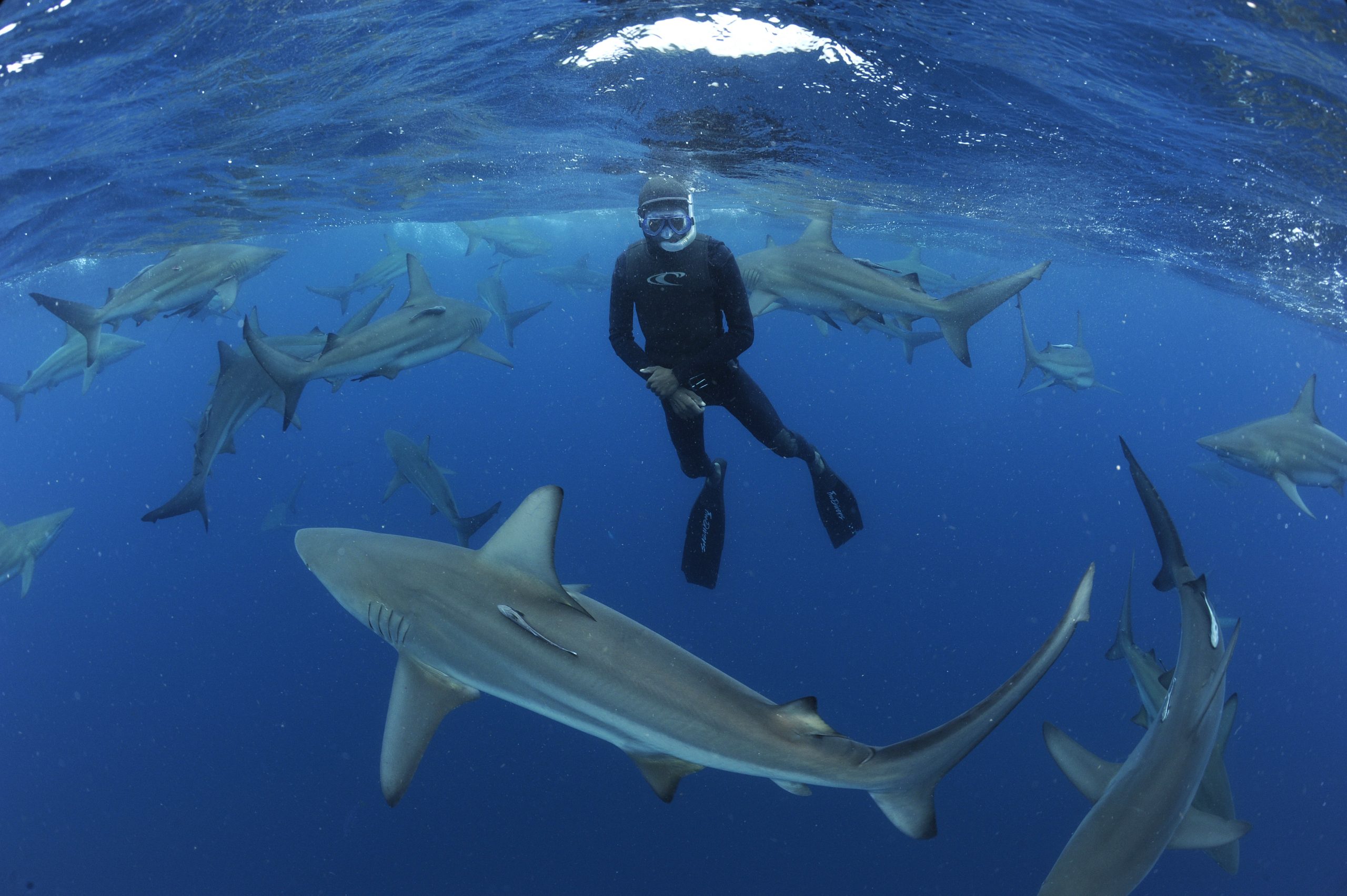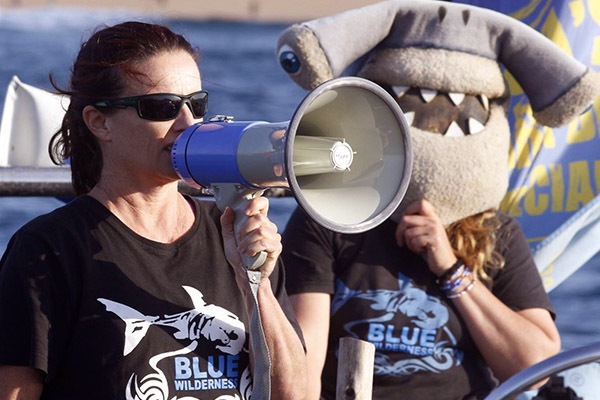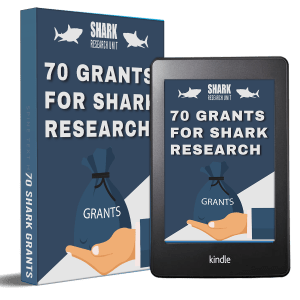SCF’s board is comprised of leaders in results driven conservation. Their depth of expertise in grantmaking and wide sphere of influence positions SCF to invest in and champion initiatives with the greatest purpose and impact. The board, coupled with a staff that has extensive policy expertise, excels at identifying and funding the most strategic projects that are focused on the global defense of sharks and rays.
Our ocean’s health and biodiversity is threatened by climate change and overfishing; decimating marine species and putting food supplies, livelihoods, and entire communities at risk. The Paul G. Allen Family Foundation focuses on improving understanding of sharks, rays, and coral reefs through academic research and applying that knowledge toward conservation efforts.
Conservation Grants Fund (previously called the Conservation Endowment Fund, or CEF) are awarded in six categories: Animal Health, Animal Welfare, Conservation Education, Field Conservation and/or Reintroduction, Management and/or Breeding and Research. AZA-accredited zoos and aquariums of all sizes have received CGF grants. Many grants have been awarded to collaborations among AZA-accredited institutions; state, federal and international wildlife agencies; academia; and major conservation NGOs. Please check their website for eligibility and application guidelines.
Auckland Zoo supports wildlife conservation in the wild, both in New Zealand and around the world. Please check their website for application deadlines.
The Biodiversity Foundation (Fundación Biodiversidad) is a public foundation of Spain’s Ministry of Environment and Rural and Marine Affairs. The Foundation funds projects in Spain and internationally in themes of biodiversity, climate change, and sustainable development. Most international cooperation projects are in Latin America, and to a lesser extent in Sub-Saharan Africa. However, there are no geographical restrictions. Grants in international cooperation are open to Spanish organizations; nonprofit organizations in EU countries; nonprofit organizations in developing countries with international support from Spain and international organizations. Check the website for the annual application deadline.
CSI’s goal is to assist cetacean science, conservation and education projects and people in Latin America, Africa and the Caribbean. Their general priorities are for urgent conservation/management issues and projects, but they will consider travel to conferences and courses. Grant requests may be made at any time, and can be expedited forspecial needs. CSI prefers to give small grants to help as many people as possible, rather than large grants to a few projects. There are several other ways CSI may help, with useful contacts, letters of support, and equipment.
The Chicago Board of Trade Endangered Species Fund considers proposals for a specific threatened, vulnerable or endangered species or a specific habitat that is of high biological value or that is substantially threatened (IUCN Red List Status). Applications are evaluated 4 times a year. Please check their website for application guidelines and deadlines.
The ESRI Conservation Program is the non-profit support arm of the Environmental Systems Research Institute (ESRI). Through our donations, We have helped to create and develop spatial analysis, computer mapping and geographic information systems (GIS) capability among thousands of non-profit organizations and individual projects of all sizes and types worldwide. Please check their website for application guidelines.
Fondation Ensemble aims to promote a sustainable human development, i.e. integrating environmental protection, in every supported project. Their Small Grants Fund is involved in five intervention sectors, under the sign of Sustainable Development: Sustainable Agriculture, Sustainable Fishing, Biodiversity Conservation, Renewable Energies and Eco-materials. Check their website for application guidelines and deadlines.
The Ford Foundation is a large grant maker on a world scale, and it makes about 2,000 grants per year. The Foundation’s program in Sustainable Development includes grant making for conservation and natural resources, e.g., climate change and community-based resource management. Most of the foundation’s grant funds are given to organizations. Ford also makes grants to individuals for fellowships towards advanced degrees in areas of interest to the Foundation. Applications to the Foundation are through its regional offices. For each region, Ford explains its grant-making priorities, the types of grants it provides, and the application process.
The Future for Nature Foundation presents the Future for Nature Award to recognize and financially support individuals for their efforts in species protection. The Foundation gives priority to the conservation and protection of endangered species (i.e., IUCN’s Red List). Check their website for annual application deadline.
GCF, made possible by the Gordon and Betty Moore Foundation, aid financing protected areas. Check their website for eligibility.
The Gordon and Betty Moore Foundation’s Marine Conservation Initiative supports marine conservation projects, mainly related to sustainable fisheries. Check their website for eligibility.
Among other program areas, the J.M. Kaplan Fund supports grant making in Environment. The emphasis is marine conservation, especially in ocean waters that lie beyond the jurisdiction of a single national government. Organizations submit a brief letter to describe their work and its relevance to the specific program interests of the Fund.
The Lighthouse Foundation promotes science and research, teaching, culture, and the principles of environmentalism and international development in relation to the world’s seas and oceans. Themes include coastal and marine ecotourism at the community level; artisanal fisheries; mariculture; marine policy and management; support for marine reserves; mangrove protection; and others. Grant recipients are conservation NGOs, community NGOs, universities and educational organizations, and government organizations. Applications can be made throughout the year.
Marine Conservation Institute awards grants to promising young scientists studying what our oceans were like before humans began significantly altering marine ecosystems. This information is essential for helping us set appropriate targets for marine conservation efforts. Check their website for application deadlines.
The Nando Peretti Foundation provides grants to projects which fall into one of the following areas: Charity, Educational, Environmental conservation, Medical research, Construction, Cultural/Artistic. The categories “Campaigns” and “Historical Partners” include projects which are grouped according to various criteria. Check their website for annual application deadlines and application guidelines.
The Conservation Trust is a grant program that supports innovative solutions to conservation challenges and issues of global concern. The Trust encourages projects with a strong emphasis on conservation science. In particular, it seeks to support those projects that test and critically evaluate alternative approaches to conservation. Projects that hold potential as media subject matter are also encouraged, as National Geographic’s vast audience offers our grantees opportunities to make a broad public impact. Please check the website for application guidelines and deadlines.
OceanCare works on conservation and research projects worldwide in a global commitment to protect marine mammals and oceans. Check out their website for contact information.
The Project AWARE Foundation aims to conserve underwater environments through education, advocacy, and action. Project AWARE makes grants to nonprofit organizations, institutions, and individuals for activities directly related to conservation of underwater environments — both marine and freshwater – on a worldwide basis. Check their website for application deadlines.
The Rapid Response Facility (RRF) is jointly sponsored by Fauna & Flora International, the UNESCO World Heritage Center, and the United Nations Foundation. The RRF delivers rapid conservation funding in times of crisis, with a focus on UNESCO’s natural World Heritage sites.
Eligibility for grants extends to agencies legally responsible for site management; registered NGOs (local, national, international); and the private sector. Completed application forms are submitted by email at any time. RRF aims to process applications and make decisions within a few working days.
The Ocean Fund of Royal Caribbean supports efforts to restore and maintain a healthy marine environment, minimize the impact of human activity on this environment, and promote awareness of ocean and coastal issues and respect for marine life. Ocean Fund grants are made annually to a variety of nonprofit groups and institutions conducting activities directly related to marine conservation. Check their website for application guidelines.
SOSF offers a series of Grants dedicated to research, conservation and/or education projects worldwide. Projects should integrate at least two of these components, and the focus is on charismatic marine megafauna, and particularly Sharks, Rays and Skates. Please check their website for their application guidelines.
SeaWorld Conservation Fund supports projects in 4 key categories: Species Research, Animal Rescue and Rehabilitation, Habitat Protection and Conservation Education. Check their website for application guidelines.
SOS offers grants that can be applied specifically to saving threatened species and their habitats. There are two types of grants: Threatened Species Grants and the Rapid Action Grants. Please check the website for eligibility and application guidelines.
The Species Conservation Fund’s reach is truly global, and its species interest is non-discriminatory. It is open to applications for funding support from conservationists based in all parts of the world, and will potentially support projects focused on any and all kinds of plant, animal and fungus species, subject to the approval of an independent evaluation committee. Please check the website for application guidelines and deadlines.
The Youth Activity Fund Grant supports high school students and college undergraduates. Its goal is to foster a new generation of explorers dedicated to the advancement of the scientific knowledge of our world. The Exploration Fund Grant is for graduate, post-graduate, doctorate and early career post-doctoral students. It provides grants in support of exploration and field research for those who are just beginning their research careers.
Check their website for annual application deadlines.
The World Ocean Fund is The Ocean Foundation’s most general pooled fund, designed for donors of all sizes who have an interest in the saving our oceans and no particular ocean conservation issue in mind. The Fund addresses urgent needs, emerging issues, and provides grants in areas that do not yet warrant a specialized fund. The Foundation has furthermore several other funds such as the Ocean Leadership Fund. Please check their website for eligibility and application guidelines.
The Disney Worldwide Conservation Fund provides financial support for the study of wildlife, the protection of habitats and community conservation and education. The goal is to support conservation organizations focused on long-term positive impacts for wildlife and habitats. The Annual Conservation Grants are by invitation only. However, there is also a Rapid Response Fund provided in response to urgent environmental or conservation needs.
The Foundation supports a program area in environment which makes grants for marine biodiversity, marine invasive species, and marine ecosystem restoration. Grant recipients are a wide range of international organizations, government agencies, conservation NGOs, and research institutes and universities in France and internationally. Applications can be made throughout the year. Check their website for application guidelines.
The Walton Family Foundation supports projects that pursue lasting conservation solutions for oceans and rivers. Check their website for application criteria and guidelines.
In collaboration with the Waitt Institute for Discovery, the Waitt Family Foundation supports two grant-making areas, one of which is Ocean Conservation, Exploration, and Rejuvenation. Grants focus on raising global awareness about declining ocean life; research of ocean ecosystems; and undersea exploration.
WDC supports and leads ground-breaking scientific research, funding whale and dolphin conservation field projects around the world.
There are several types of grants from WCS such as the Conservation Leadership Programme, WCS Graduate Scholarship Program, Climate Adaptation Fund and the Wildlife Action Opportunities Fund. Please check their website for application guidelines.
WWF works to provide long-term, sustainable financing to biodiversity conservation by partnering with governments, private industries, communities and other non-governmental organizations. Furthermore, WWF’s professional development grant provides support for mid-career conservationists to pursue short-term, non-degree training to upgrade their knowledge and skills through short courses, workshops, symposiums, conferences (if presenting), and professional exchanges. Check their website for eligibility and application guidelines.
SPECIFIC REGIONS
Africa and Asia – The Alexander Abraham Foundation makes grants to conserve the environment and defend wildlife. Themes include wildlife protection, animal welfare, habitat conservation, ecotourism, and alternative sources of income to support conservation. Grants are made to conservation researchers and NGOs, mainly in Asia and Sub-Saharan Africa. Applications can be done throughout the year.
Blue Action Fund provides grants to selected conservation projects in marine protected areas (MPAs) and their buffer zones, targeting the most sensitive coastal waters of Africa, Latin America and Asia/Pacific and focusing on projects with measurable outcomes in two areas: Blue Action Fund’s grant-awarding process is based on Calls for Proposals only.
The Flagship Species Fund supports the conservation of endangered species and their habitats in developing countries. Recipients of main grants are conservation NGOs, development foundations, universities, and government agencies. Recipients of small grants are individuals as well as organizations. Check their website for annual application deadlines and submission guidelines.
The Global Environment Facility (GEF) is an independent financial organization that provides grants to organizations in developing countries for projects that benefit the global environment. GEF’s many categories of grants include the Small Grants Program (SGP), administered by the UNDP. Small grants are made to community-based organizations and non-governmental organizations (NGOs) in participating countries, and at sites that correspond to GEF’s operational programs. Check their website for the ‘eligibility quiz’.
IDEA WILD’s efforts conserve biodiversity by providing biologists and educators working in developing countries with equipment and supplies to aid in their conservation efforts. Check their website for application guidelines and deadlines.
The Liz Claiborne and Art Ortenberg Foundation is dedicated to the survival of wildlife and wildlands, and to the vitality of human communities with which they are linked. The Foundation devotes a substantial share of its funding to developing countries in Asia, Africa, and Latin America.
Thematic areas include community management of natural resources; wildlife conservation; ecosystem research and management; and parks and other protected areas. Check the website for application guidelines.
Mitsubishi’s thematic interests include biodiversity conservation; environmental education; environmental justice; and sustainable development and poverty alleviation. They do not use a standard application form. Grant seekers briefly describe their objectives, activities, and funding information. Annual application deadlines are different for MCFA than for MCFEA.
The Nature and Discoveries Foundation (Fondation Nature & Découvertes) funds conservation projects in France and Francophone Africa. Grants are for nature protection; environmental education; and public awareness. Check their website for the application guidelines.
The New England Biolabs Foundation supports grassroots organizations working with the environment, social change, the arts, elementary education, and science. Its Environment program includes themes on marine conservation, sustainable organic agriculture, environmental education for teachers and schools, and sustainable economic development.
Grants are to grassroots organizations, emerging support groups, and charitable organizations working in selected developing countries The Foundation occasionally makes grants to individuals for small environmental research projects, and to individuals representing nonprofit organizations. Check their website for annual application deadlines.
The Prince Bernhard Fund for Nature aims to help save critically endangered flora and fauna in tropical and subtropical regions of Africa, Asia and Latin America. Organizations from other regions can qualify for support if there is a substantial element of partnership with, and strengthening of local partner organizations. The Fund’s mission is to support small, preferably local initiatives. Applications are being reviewed biannually. Check their website for application deadlines.
The Prince Albert II of Monaco Foundation funds projects for the environment in three program areas: biodiversity, climate change, and water. The Foundation is particularly interested in the Mediterranean Basin, the polar regions, and the least-developed countries vulnerable to the negative impacts of climate change. The Foundation is open to requests throughout the year, whatever their size or geographic origin, from any type of public or private organization, which meet the other criteria of the Foundation’s grant making.
The Rufford Foundation offers support for nature conservation projects in the developing world. There are five stages of funding available. Applications can be done throughout the year. Application criteria and submission guidelines can be found on their website.
The Terra Viva Grants Directory develops and manages information about grants for agriculture, energy, environment, and natural resources in the world’s developing countries.
WNF offers awards to leaders of nature conservation projects in the developing world. WFN gives priority to grassroots initiatives, and to projects that take an ecosystems approach. Most successful proposals have a significant human element (i.e., community education and involvement). Check their website for application deadlines.
The Marine Research Grant programme covers all subject areas of marine science and technology. However, preference is given to research in those areas that are designated as being high priority within the development plans of the WIO member states. Check their website for application guidelines and deadlines.
MORE OPPORTUNITIES
California Sea Grant College
David and Lucile Packard Foundation (Oceans and Coasts)
Mellon Foundation
Pew Charitable Trusts
PADI Foundation
Tegner Memorial Research Grants
Women’s International Science Collaboration (WISC) NSF
North American Assoc for Environmental Education (NAAEE)
ESA Species Recovery Grants
Prescott Marine Mammal Rescue Assistance Grant Program
NMFS Proactive Species Conservation Grants
NMFS Grants
NOAA Coastal Services Center Funding Catalog
National Fish and Wildlife Foundation
NOAA Coral Reef Program
NOAA Marine Debris Program
Oregon Sea Grant
Rufford Small Grants
Sigma Xi (students)
Lerner Gray Fund for Marine Research (students)
National Geographic Society
American Society of Ichs and Herps Raney Fund (students)






 Let us know where we can send fundraising opportunities. In the meantime download our eBook featuring 18 scholarship awards for study-abroad adventures
Let us know where we can send fundraising opportunities. In the meantime download our eBook featuring 18 scholarship awards for study-abroad adventures  Let us know where we can send fundraising opportunities. In the meantime download 40 great fundraising ideas eBook right here
Let us know where we can send fundraising opportunities. In the meantime download 40 great fundraising ideas eBook right here  Let us know where we can send you more fundraising insights to help jump start your career as a marine scientist
Let us know where we can send you more fundraising insights to help jump start your career as a marine scientist